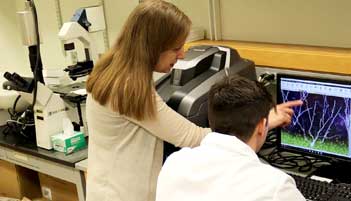HOW CAN WE HELP YOU? Call 1-800-TRY-CHOP
In This Section
Clinical Geneticists Seek Novel Pathways of Pediatric Neurodegenerative Disease

Researchers will study the mechanisms behind novel pediatric neurodegenerative disorders and assess their role in adult-onset conditions.
droseyb [at] email.chop.edu (By Barbara Drosey)
After nearly a decade of informal scientific consultation, two researchers from the Division of Human Genetics are excited for their first official collaboration. Rebecca Ahrens-Nicklas, MD, PhD, and Elizabeth Bhoj, MD, PhD, received a Collaborative Pairs Pilot Project Award from the Chan Zuckerberg Initiative (CZI) Neurodegeneration Challenge Network that supports interdisciplinary, novel approaches for addressing key challenges in the biology of neurodegenerative diseases.
The research pair will identify novel pediatric neurodegenerative disorders, and investigate the mechanisms behind the disorders, to assess the role of these newly identified pathways in adult-onset conditions. They hope their findings will be a win for translational research with clinically relevant applications.
“Each novel gene we uncover has the potential to move the science of neurobiology forward by leaps,” the team wrote in their CZI application. “We have a high chance of success in identifying novel pathways, and each success is likely to make a significant impact on the field of neurodegeneration.”
Colleagues and friends for nearly a decade, Dr. Ahrens-Nicklas and Dr. Bhoj described this funding opportunity as designed for them. Both clinical geneticists within the Division of Human Genetics at Children’s Hospital of Philadelphia, these physician-scientists trained together until their paths diverged. In the Section of Biochemical Genetics, Dr. Ahrens-Nicklas delved into how biochemical pathways and metabolites drive diseases of the brain, while in Center for Applied Genomics (CAG), Dr. Bhoj focused on more lab-based training in the molecular diagnosis of genetic disorders.
They never strayed far, however, from each other’s professional support and scientific interests. They work in adjacent lab space, share ideas, and are often called to consult over the same tricky genetic problems. Both are attending physicians at CHOP and assistant professors of Pediatrics at the Perelman School of Medicine at the University of Pennsylvania.
The CZI grant provides something they are keenly excited about — the opportunity to collaborate formally on research questions both investigators have been approaching from their respective scientific angles: Why do children get debilitating neurodegenerative symptoms? And how can we develop targeted therapeutics to help them?
Better Answers for the Undiagnosed
Whereas neurodegeneration in adults is often multifactorial, many pediatric patients have monogenic disorders. Identification of these pediatric-onset genes can provide insights into pathways that contribute to more common adult-onset disorders.
But, despite monogenic prevalence, pediatric patients with neurologic symptoms who undergo clinical genetic evaluations receive a molecular diagnosis in just 35 percent of the cases. In pilot work, they already have increased diagnostic rates by 20 percent when compared to clinical exome sequencing alone. With their complementary skills and ability to collaboratively phenotype patients and complete analysis of multi-omics data, Drs. Ahrens-Nicklas and Bhoj aim to further increase the diagnostic rate.
“We’ve gone through diagnostic workups for years for some of these families,” Dr. Ahrens-Nicklas said. “To be able to offer a research basis to hopefully get an answer for a family is something I'm really excited about.”
Both Drs. Bhoj and Ahrens-Nicklas will examine and perform deep clinical phenotyping on undiagnosed patients with a history of progressive neurologic regression and/or evidence of neurodegeneration on brain imaging. The team will then study the mechanisms driving neurodegeneration in animal models of these disorders, assess how the pathways might contribute to adult-onset conditions, and identify potential therapeutic targets.
“Sometimes the pediatric forms of neurodegenerative diseases are the extreme cases, and subtle changes in that gene may be associated with more common forms of adult-onset neurodegeneration,” Dr. Ahrens-Nicklas said. “This project is giving us new avenues to investigate and new places to look that could be applicable to more common adult-onset disease.”
This collaborative pair aim to replicate the success of prior models in which pediatric monogenic disease has been successfully translated into adult therapy. In their CZI application, Drs. Ahrens-Nicklas and Bhoj noted how researchers studying Gaucher Disease, a rare metabolic disorder, helped reveal mechanisms underlying Parkinson Disease. They hope to repeat such a success story using novel drug targets for rare pediatric monogenic disease and common adult neurodegeneration.
“We'll be drawing on the expertise and insights of our collaborators throughout CHOP, especially later in the proposal, in terms of thinking about developing therapies for some of these new disorders,” Dr. Ahrens-Nicklas said.
A Head Start
The team will recruit subjects from their large clinical population in the Division of Human Genetics at CHOP and from the international population of patients with neurodegeneration already enrolled in the CAG research protocol.
With more than 2,000 patients with pediatric neurodegeneration already enrolled in their research protocol through the CAG, Drs. Ahrens-Nicklas and Bhoj are confident they can overcome pandemic-related challenges to their project’s operational goals. The fact that CHOP is a large clinical referral center for pediatric patients with neurologic regression also greatly improves their chances for recruitment success.
”Although this may be a difficult time to get patients here to physically provide samples, we have a collegial community we can rely on for banked samples — namely the 800,000 samples within the CAG biobank and 56,000 samples housed in Penn’s Biobank — and can build on available expertise to get our pilot up and running immediately,” Dr. Bhoj said.
The CZI award provides $150,000 over 18 months to successfully gather preliminary data, making them eligible to apply for four additional years of project development support.